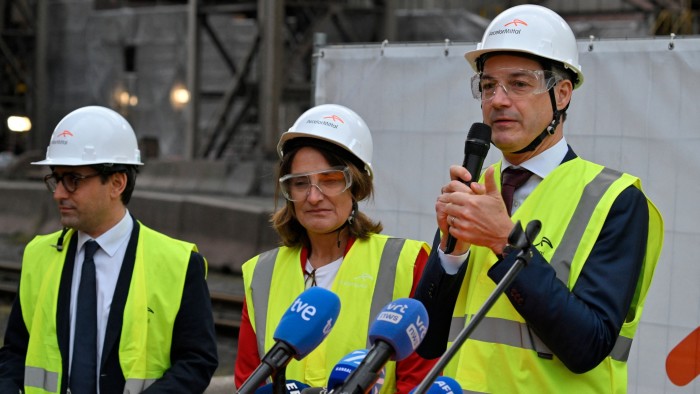Good morning. A scoop to start: The head of Germany’s central bank has told the Financial Times that the country’s restrictive ‘debt brake’ should be reformed to allow increased spending on defence and infrastructure modernisation, and address its “complicated” and “weak” outlook.
In Brussels, police last night raided the homes of Didier Reynders, who three days ago stepped down as EU justice commissioner, as part of a probe into suspected money laundering. Follow The Money and Le Soir had the scoop.
Today, our climate correspondent reports on the EU’s efforts to both toughen up rules on Chinese investment and support domestic industrial companies. And Estonia’s health minister tells my Brussels colleague that richer countries are blocking reforms that would help the EU’s poorer states get new medicines faster.
Steel yourself
The EU’s new competition tsar has said that the bloc must look more closely at its subsidies to make sure that they do not benefit Chinese companies, writes Alice Hancock.
Context: The EU is considering tightening its rules for giving subsidies to Chinese companies to echo China’s own rules, which pressures foreign companies into sharing their intellectual property in exchange for access to the Chinese market.
The European Commission yesterday announced a €4.6bn tender for technologies for decarbonisation, including batteries, under its Innovation Fund. But Chinese companies will only be able to access that money if they agree to transfer intellectual property rights to the EU and meet other criteria, including cutting emissions.
“What is the Innovation Fund being used for?” EU executive vice-president Teresa Ribera asked yesterday. “How can we ensure that things work in an economy which is an open market and an open economy, but that does not mean that we are undermining the capacities of those companies that are playing in a sound, transparent and effective manner?”
Speaking during a visit to the ArcelorMittal plant in Ghent, Belgium, Ribera said that the EU should also “look at” tightening its rules for subsidies more broadly. Belgian Prime Minister Alexander De Croo and Stéphane Séjourné, another commission executive vice-president, also took part in the visit.
De Croo endorsed the bloc taking a more forceful stance against Chinese companies. “You could call that reciprocity, right?” he said. “I have no problem with the Chinese coming and investing here as long as we can do the same there. The things that we put forward are simply the things that they impose.”
Ribera said that the EU must ensure “a permanent flow of investment dedicated to innovation . . . and avoid a kind of subsidy race”.
The visit was a reaction to ArcelorMittal’s decision last week to delay investments in Europe over policy uncertainty.
The European Commission has committed €3bn to ArcelorMittal to support its decarbonisation plans, which De Croo said would cut Belgium’s overall emissions by 2 per cent — if they go ahead. The steelmaker’s owner Lakshmi Mittal wrote yesterday that “policy clarity” from Brussels was required to save the continent’s industrial base.
Chart du jour: Death from above
How Russia uses civilians as ‘target practice’ for killer drones: Read this special FT visual investigation into 9,500 drone attacks on the southern Ukrainian city of Kherson.
Drug dealing
EU health ministers are haggling over a blockbuster pharmaceutical reform package, but smaller and relatively poorer countries are worried that it will not address long-standing issues affecting their supply of medicines, writes Andy Bounds.
Context: The European Commission in April 2023 proposed cutting market protection for new medicines, unless drugmakers made them available in all 27 member states within two years of approval. Germans have access to 10 times as many new treatments as Lithuanians, according to commission data.
But there is deadlock over the proposal, as countries with a big pharmaceutical industry such as Germany, France and Denmark oppose a measure that could hit company profits.
Drugmakers can usually sell their medicines for 10 years without facing competition from generic manufacturers. Estonia’s health minister Riina Sikkut told the FT that this makes some citizens “second-class patients”, as manufacturers typically opened talks with her country around two years after a drug was authorised in other member states because of its small market.
The EU proposal foresees cutting the protection period to eight years, then adding up to four more years of protection if the producers fulfil certain conditions, such as making the medicines available in the whole bloc or creating drugs that treat more than one condition.
But Sikkut’s plea to change the rules in line with the commission proposal fell on deaf ears at a meeting of ministers yesterday, diplomats said.
Hungary, which holds the rotating presidency of the EU, is trying to find a compromise by offering a stick and a carrot. Its latest idea is that individual member states could revoke market protection for companies that do not supply new drugs within four years.
What to watch today
-
French government faces no-confidence vote in the National Assembly.
-
Italian Prime Minister Giorgia Meloni hosts Hungarian Prime Minister Viktor Orbán in Rome.
Now read these
Read the full article here

